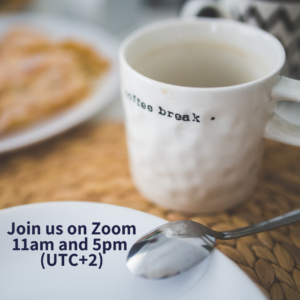We started talking about the recently finished IATEFL conference. Some of us were big fans and regular attenders whereas others had never been. The fans talked about leaving on a TEFL high that carried through to a bounce in our professional step that lasted a while, a feeling of being inspired. Others baulked at the cost (was it really 300 pounds for this year’s online conference?) and we noted that many people are paid for by their workplaces.
We went on to talk about other conferences too… TESOL-SPAIN got (yet another) honourable mention for the use of the Whova app which contributed massively to the buzz and the connection around the event.
We talked about submitting proposals for upcoming events (ACEIA, Innovate and TESOL-SPAIN). We were chatting about Innovate and how at a previous event they had drop-in sessions – an hour-long slot in the timetable where there were a number of things happening at once with a format that meant you could come and go as you please. We chatted about how this might be feasible in an online conference and talked about how TEFL del Sur tried something similar with themed breakout rooms which you could move around, but we weren’t sure whether this required everyone to be a co-host and whether it would be feasible for a larger event.
We also chatted briefly about the ELT Workshop which offers monthly PD events on Zoom and is a really nice way to connect with other ELT professionals.
And we talked about Clubhouse which is an audio-only app which is now available for Android as well as Apple. There seems to be some weird etiquette, such as introducing yourself each time you speak as people can come and go as they choose. We thought it could perhaps be used as a tool for conversation classes as you can set up a private room but then could perhaps have an open event every couple of months as a way of marketing your classes.
We also chatted a bit about podcasts and the difficulty of when to listen to them. Some people like to listen to them whilst out for a walk, others manage to multitask and get on with other things with one on in the background.
We also talked about both FOMO and JOMO (the fear of missing out and the joy of missing out), that we can’t possibly do everything and we do need to look after ourselves, one way of doing that is by being very selective with what we go to.
We acknowledged that we (as committed Hubbers!) are often really engaged in development in lots of ways but there are also lots of people that aren’t so engaged. There are lots of teachers and trainers who do a fabulous job but aren’t connected with CPD and just continue moving forward in their own way.
Making choices
We agreed that we much preferred conferences and other professional development events that have audience guidelines. Conferences do tend to include descriptors “This session is useful for…” but often webinars and other CPD events don’t. We agreed that having clearer guidelines across all events would make it easier for us to pick and choose what to attend.
We talked about our favourites; John Hughes’ short development videos got a special mention for his authentic, natural and professional approach as did Rachael Roberts’ ELT Resourceful and Lightbulb Moments.
We then talked about some people’s desire to keep studying, always and forever! The MA in Applied Linguistics in Limerick was recommended. One participant said that they’d done the 2 years masters course over seven or eight years!
Career development
We reflected on the fact that there are times in our lives when things just happen to us and we need to respond to unforeseen events. “Oh goodness, I’ve lost my job” can turn into the best thing ever as we are forced to re-evaluate.
Sometimes career development is seemingly so much about being in the right place at the right time (with the right attitude!) We thought that to “succeed” in TEFL you have to be a “yes” person, to be useful and positive in and around the workplace. We wondered whether this was the same in all professions and across all countries. One participant compared Ireland to France, in Ireland it’s easier to move “up” based on the work done whereas France feels like a more qualification driven country.
Recruitment procedures
We talked briefly about recruitment procedures weighing up experience with qualifications and worrying about Brexit-era work permit possibilities across Europe. One school has a recruitment day where there are two interviews with the DOS and the school principal as well as demo lessons for the survivors (after they had observed the group one).
Observation thoughts
And then observation reared its head, of course. We agreed that observations are always rather odd under nearly any circumstances. We thought the best thing would be to start with an issue, a problem or a puzzle and that observation would then be one of several possible options and then there could be several options around observation. We talked about observation to empower teachers through choice of group and choice of observation style. We identified a few different ways to observe; a traditional “management” observation, peer observation and a ghost (or self) observation. There was also a “selfie” observation, as an addition to the self obs, where the teacher takes pics to use in the observation feedback. This acknowledges that recall is so often so very unreliable and this adds in some evidence based and helps things be more dialogic in approach. Another approach to self obs was filming or voice recording obs and then giving teachers the power to edit their recordings. Recordings could then become part of a teacher’s CPD portfolio.
And in the 5pm hangout, we watched Harry’s shave!
